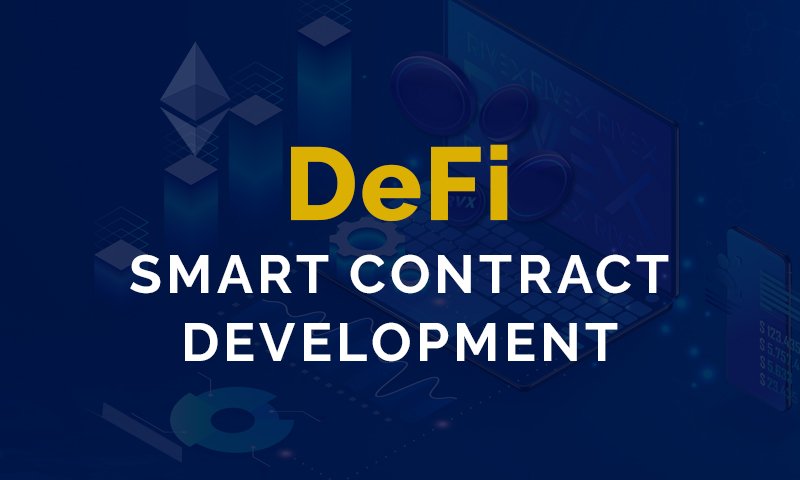Development of DeFi smart contracts

The decentralized finance sector is skyrocketing. In our article, you will learn about DeFi smart contracts, their use, development opportunities, as well as the advantages and disadvantages of this instrument. Why do smart contracts in DeFi spread so quickly and play such a crucial role within the blockchain? Boost your knowledge with ICODA.
What is DeFi?
DeFi (Decentralized Finance) consists of financial instruments, services, and applications built on the blockchain. A decentralized finance ecosystem was originally envisioned as an alternative that replaces existing financial system standard technologies in banking with open source protocols, also known as decentralized finance protocols.
DeFi Development is rapidly improving and gives investors the opportunity to gain access to decentralized lending and contemporary platforms. It also allows investors to receive passive earnings from cryptocurrency assets through decentralized finance applications.
Decentralized financial ecosystem
Launched in late 2017, the MakerDAO platform was a pioneer among DeFi applications that have gained massive popularity. Since then, the total amount of funding placed in DeFi protocols (TVL, Total Value Locked) has continuously increased.
According to the data, TVL was $500 million in May 2019. In May 2020, it already totaled $950 million, and in November 2021 it reached a record amount of $236 billion.
Most of the existing DeFi protocols are built on the Ethereum blockchain, but some of the more modern applications are trending steadily upwards. As this financial sector grows, so does the need for decentralized applications (DApps) within it, requiring smart contracts that perform complex tasks. Such a need has led to the growing popularity of DeFi smart contract development.
What is a smart contract in DeFi?
The computer scientist Nick Szabo is the developer of the phrase "smart contracts." He came up with this concept in 1994; Furthermore, he invented a virtual currency called “Bit Gold” in 1998. The American scientist thought that regular legal contracts may be greatly enhanced by the creation of smart contracts employing digital security measures.
As an example of a smart contract, Szabo utilised vending machines that served coffee or offered snacks like chips and candies. The "contract" customers invested their cash in a device that would automatically uphold the terms of the contract and make the transaction.
As for the definition, a smart contract in DeFi Token Development is a piece of code that can be executed automatically. DeFi smart contract code is generally held and uses the blockchain to increase its reliability and protection. You can independently receive, store and transmit funds; furthermore, it calls other smart contracts when needed. It follows if-then semantics to simplify its programming and acts as a component that allows DeFi protocols to work efficiently. All DeFi, DApps, and protocols need properly coded smart contracts.
Smart contracts were initially invented to eliminate human intervention in decision-making, as unavoidable human error is the most frequent source of damage or instability in traditional contracts. Nowadays, smart contracts take on the functionalities of decentralized financial protocols, which increases their efficiency.
Which decentralized financial services use smart contracts?
The predominant blockchain that operates DeFi smart contracts is Ethereum. On Ethereum, smart contracts are usually made up of a programming language called Solidity.
According to State of the dApps, nearly 80% of DeFi applications run on the Ethereum network. Smart contracts are also supported by Solana, the quickest cryptocurrency currently active on the block. These two main players are followed by Polkadot, Ergo, Cardano and Algorand.
Smart DeFi
We can divide DeFi Development Services into different categories, and these are DEXs and DApps – decentralized exchanges and applications. If you want to trade coins and currencies safely, without interruptions and controls by humans, it is better to use DEX. But you have to be careful with decentralized networks because there is no way to return or recover your money from a failed transaction.
How to avoid money leaks:
1. Check the details of the transaction and the network.
2. Please check the deposit or withdrawal address carefully.
3. Be sure to remember your secret key, which is usually 12 or 24 words long, and your password.